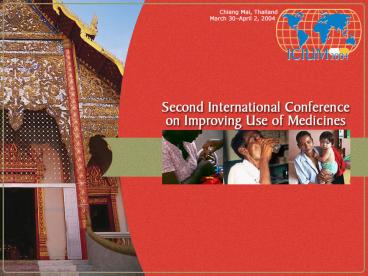Quasiexperimental study designs in evaluating medicines use interventions PowerPoint PPT Presentation
1 / 18
Title: Quasiexperimental study designs in evaluating medicines use interventions
1
(No Transcript)
2
Quasi-experimental study designs in evaluating
medicines use interventions
3
- Lloyd Matowe 1 Craig Ramsay 2
- 1 Faculty of Pharmacy, Kuwait University
- 2 HSRU, University of Aberdeen
4
BACKGROUND
- The RCT is seen as the gold standard methodology
for evaluating medicine use interventions - There are situations where it is impractical to
carry out RCTs - For example in situations where
- It is impractical to randomize subjects
- Difficult to find an appropriate control
- Intervention has been retrospectively implemented
- Quasi-experiments are often used as an
alternative
5
Simple before and after studies
Time
6
Interrupted time series analysis
Time
7
Controlled before and after design
Before
After
8
- There is suspicion that quasi-experiments are
often conducted and analysed inappropriately
9
OBJECTIVE
- The objective of this study is to evaluate the
use of quasi-experimental designs in medicines
use interventions
10
METHODS
- A rigorous systematic review
- Subset of a large study on the effectiveness of
various policy implementation strategies - Search strategies
- EPOC, MEDLINE, EMBASE, HEALTHSTAR, SIGLE
- Bibliographies of previously published reviews
- Studies included CBAs ITS
- Interventions policies/ guidelines to improve
medication use - Outcomes- Objective measures of provider
behaviour and/ or patient outcome - Time series regression used to reanalyse serial
data where reanalysis was necessary
11
RESULTS - 1
- Search strategy identified 150 000 hits
- 5 000 hits identified as potentially relevant
- 285 studies included
- 44 studies were on medicines use
- 17 were CCTs or RCTs
- 27 studies were quasi-experiments
- 15 ITS
- 12 CBAs
- 24 studies were on multiple interventions
- Study areas included Antibiotics,
antipsychotics, analgesics, GIT drugs and
anti-hypertensives
12
RESULTS - 2
- Time series
- Overall methodological quality poor
- 8 of 15 studies analysed inappropriately
- Effect size different in all 8 studies
- Common errors included
- Failure to test for autocorrelation and trend
- Analysis using non time series methods
- Failure to ascertain intervention as independent
from other interventions
13
Trends
Time
14
RESULTS-3
- Controlled before and after studies
- Overall methodological quality poor
- 7 of 12 had unit of analysis errors
- Other common errors included
- Failure to protect against contamination
- Failure to take baseline measurements
- Failure to perform power calculation
15
Controlled before and after design
Before
After
16
SUMMARY
- Quasi-experiments are often designed analysed
inappropriately - Methods and design are often inadequately
reported - Study methodological weaknesses are often
inadequately reported
17
RECOMMENDATIONS
- For ITS studies we recommend
- Use of time series regression
- Pre-testing for autocorrelation and trend
- Ascertain that the intended intervention was
independent of other interventions - For CBA we recommend
- Protection against contamination
- Measurement of baseline characteristics
- Power calculation
- For both ITS and CBAs methodological weaknesses
should be reported
18
ACKNOWLEDGEMENTS
- I would like to thank Professor Jeremy Grimshaw,
from Ottawa Health Research Institute and Center
for Best Practices, University of Ottawa, Canada
for giving me access to the studies used for this
evaluation

